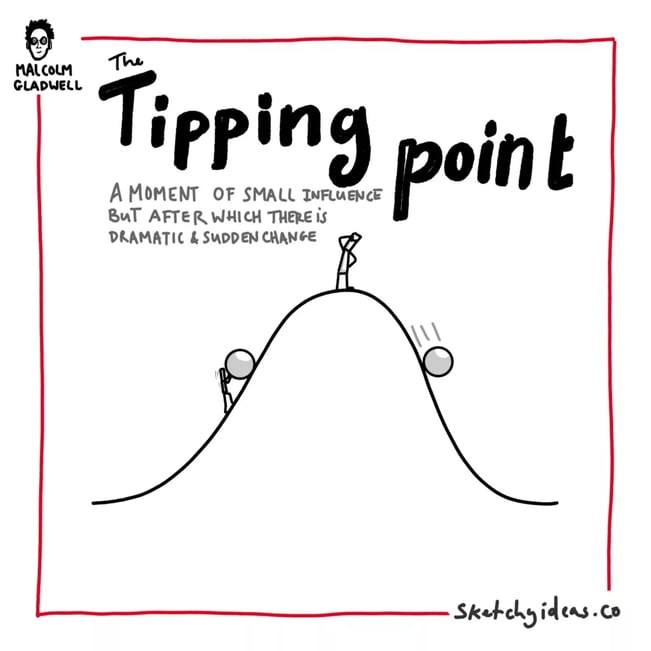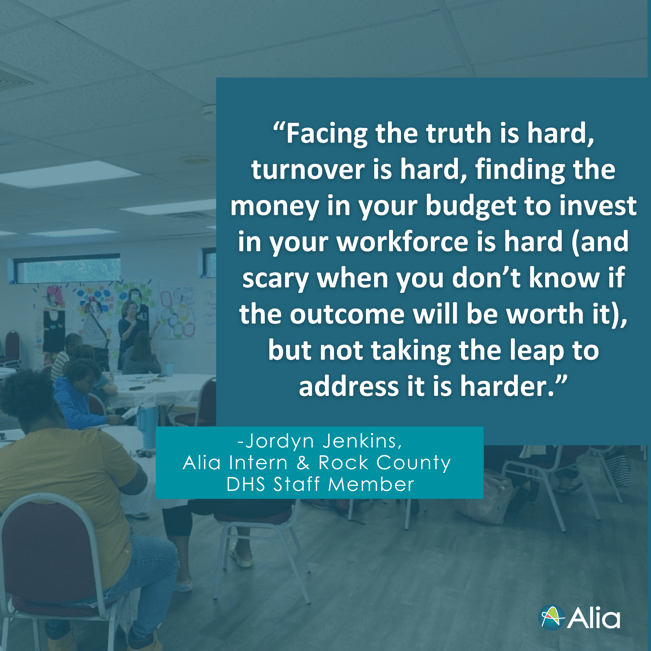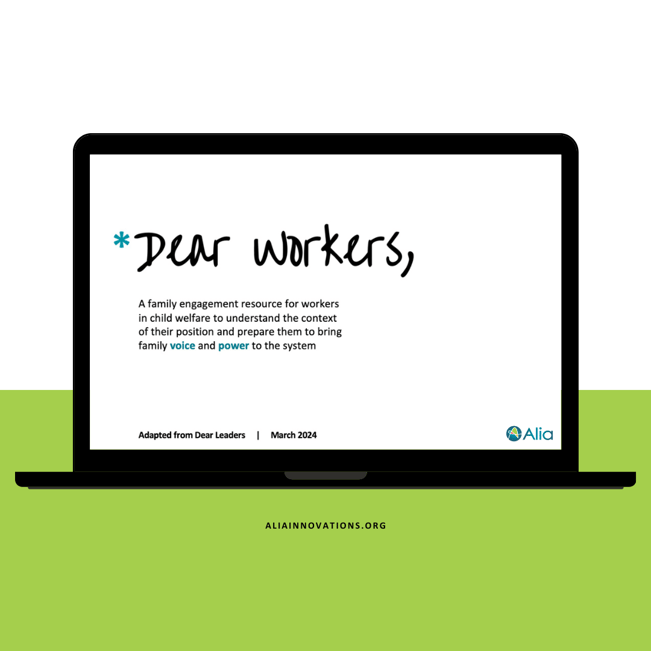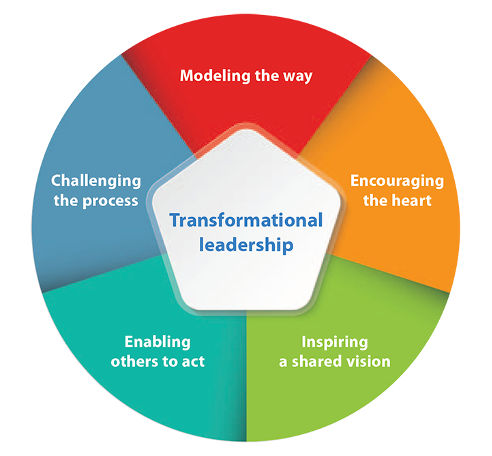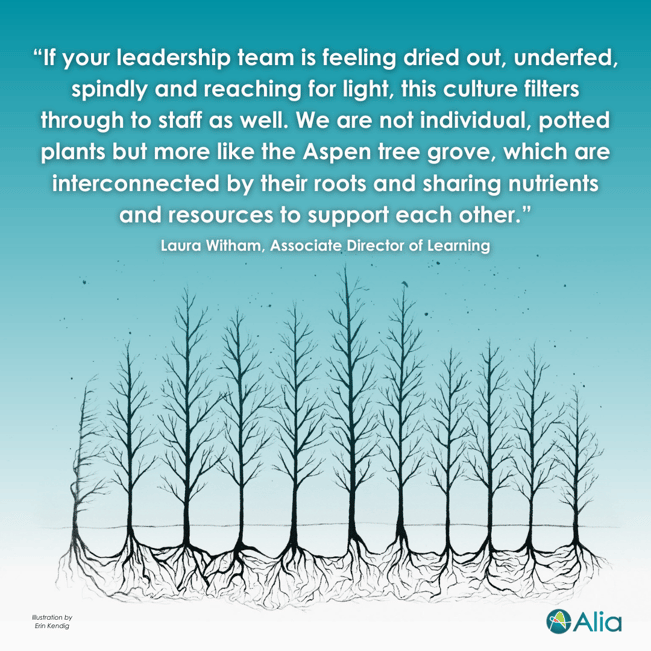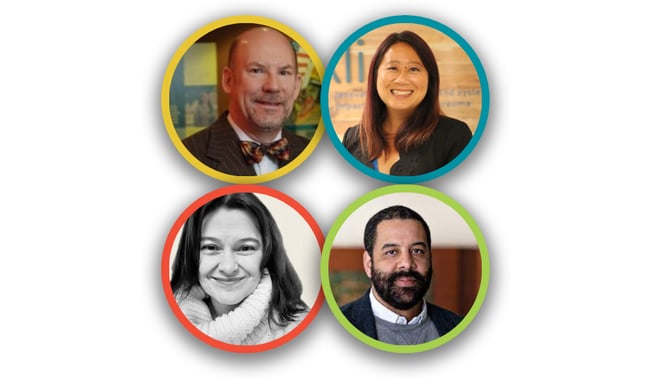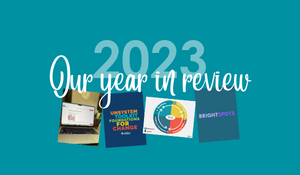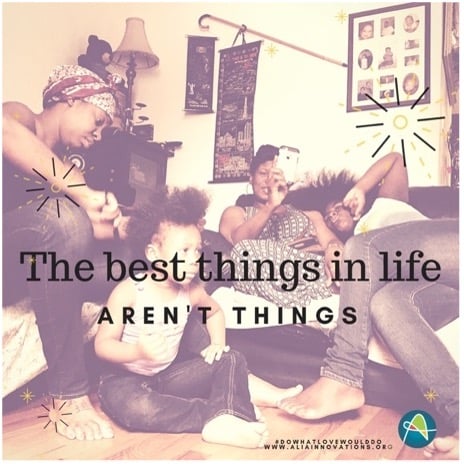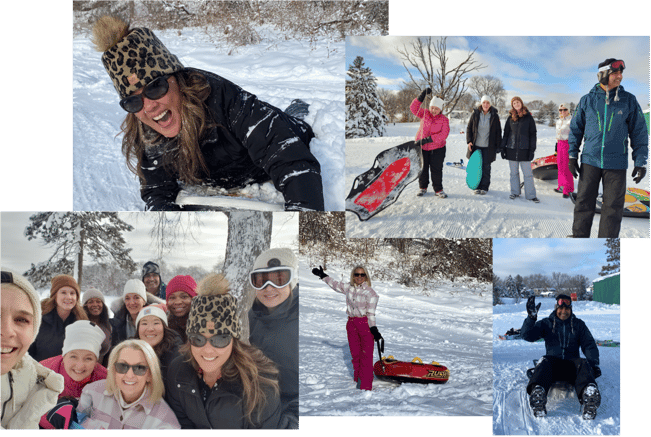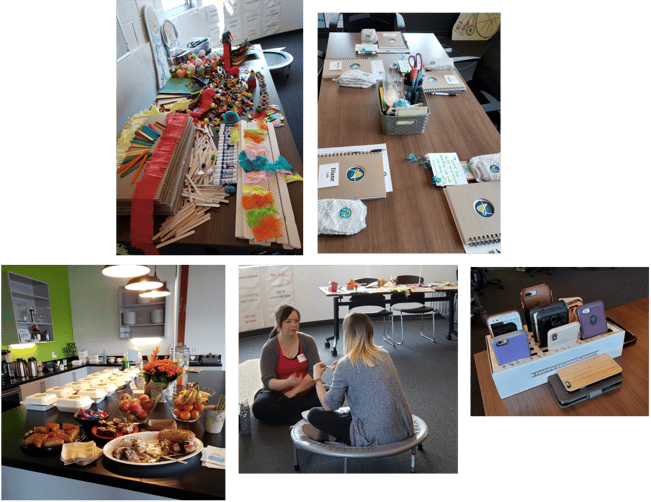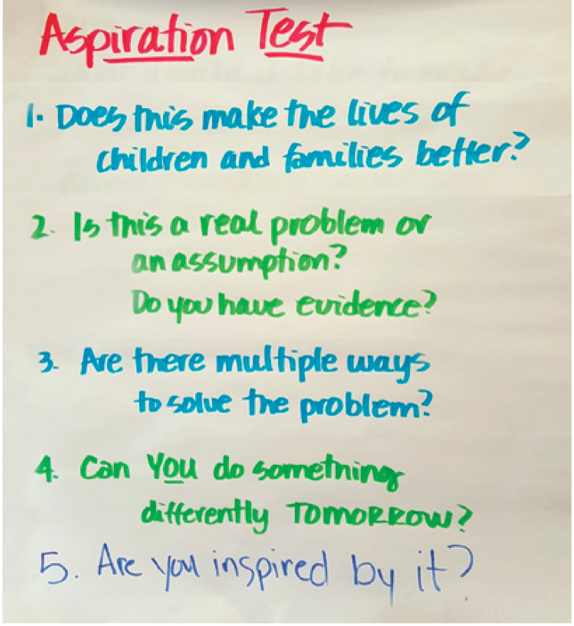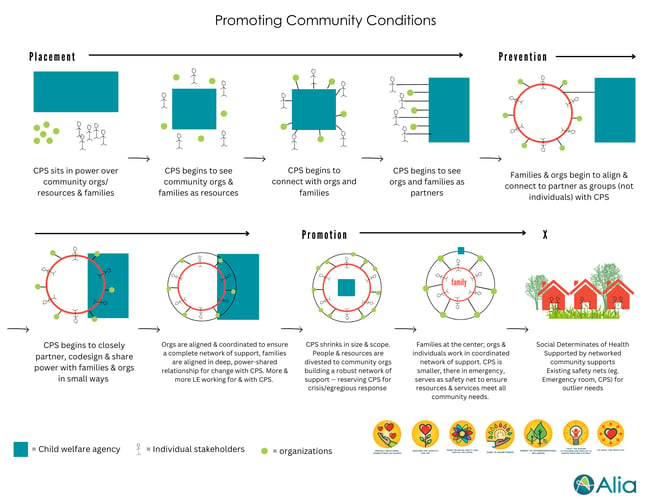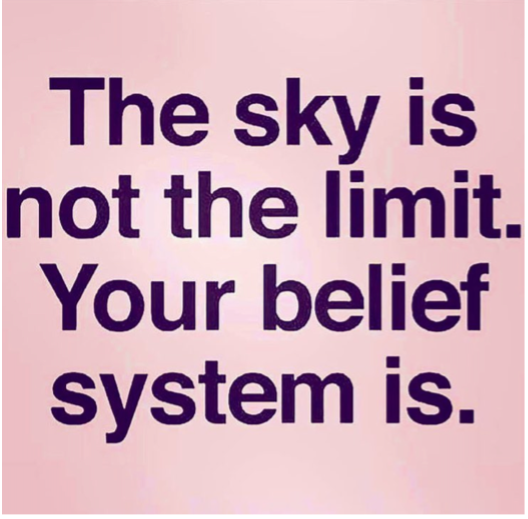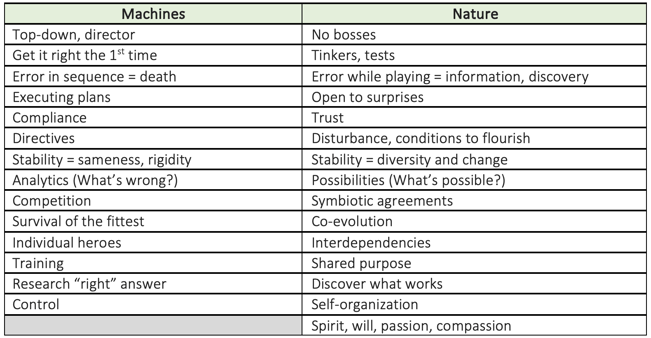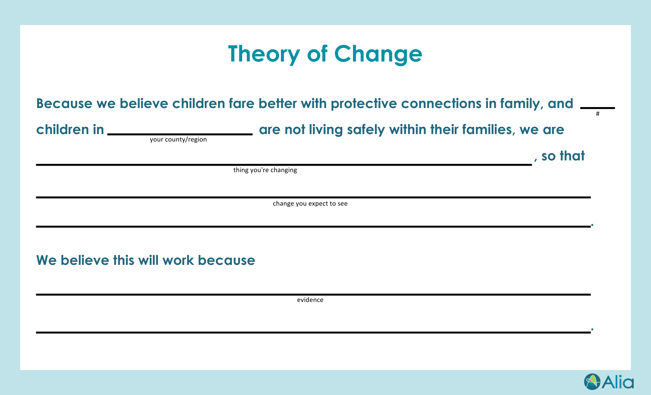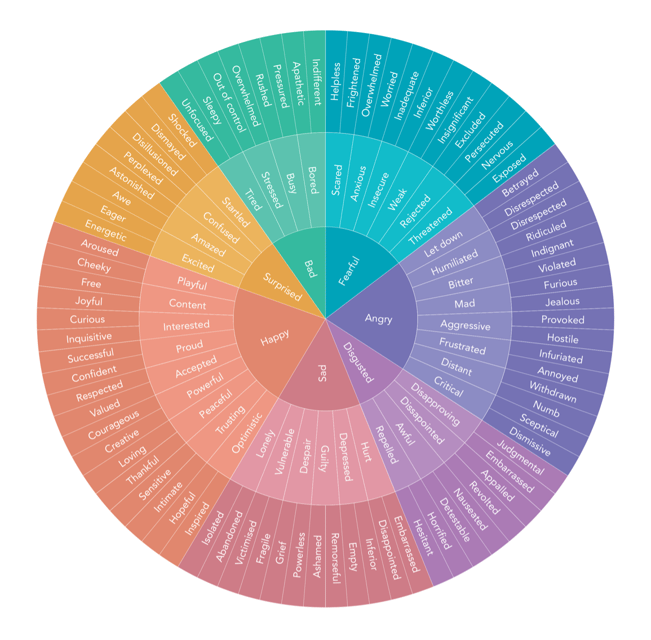“For kids who have nobody, we believe there actually are somebodies. And the question becomes: Are we willing to do what it takes to find and support those somebodies?” Amelia Franck Meyer, Alia Founder and Executive Officer
Read MoreThere are always “somebodies”: reframing permanency for youth in care
Belonging, connection & safety: they go together
Humans can do anything when we know we’re not alone. At Alia, every aspect of our work to keep families safely together is grounded in this belief—from creating a connected and resilient child welfare workforce to co-creating new ways of work in trusted relationships with those most impacted by the system, to getting youth back home for good.
Read MoreResilience & Belonging: A Lifeline for Child Welfare's Workforce Crisis
Child welfare stands at a crossroads. Nationwide, the workforce is facing overwhelming workloads, burnout, turnover, and systemic instability—increasing risk for families. Beneath the surface lies a fundamental truth: the resilience of the child welfare workforce hinges on a sense of connection and belonging to one another and their organization. At Alia, we serve organizations building a culture of belonging grounded in the evidence that a resilient workforce begins with a connected one.
Read MoreWe are continuing and expanding our ethical, equitable co-design (or 2E Co-design) in our most comprehensive project to date: a five-year partnership with Rock County Human Services. The most recent work is a movement called Rock Families First, aimed at eliminating racial disparities in the number of youth coming into foster care, reducing the number of children placed out of home, and increasing engagement and satisfaction with parents.
The BeeHive: A Testament to the Power of Community Co-design
In the heart of Rock County, Wisconsin, there exists a haven for Black women impacted by Rock County Human Services called the BeeHive. This is not your typical support group or advisory board; the BeeHive is a sisterhood, a village, a safe space where Black women can come together to share their stories, support one another, and find strength in their shared experiences. It’s also an opportunity to sit at the decision-making table to improve family outcomes.
Read More2E Co-design: Ethical & Equitable Co-design with Impacted Parents and System Staff
Throughout Alia’s existence, we’ve engaged in community co-design that brings the lived expertise and endless wisdom of those most impacted by the system together with those who hold power—knowing those closest to the problem are closest to the solution. While the process of co-designing new solutions is necessary to keep children safely within their families and communities, there is critical readiness work that must be happen to prevent additional harm to those engaged in the work. The lessons we learned to reduce harm for designers from our early co-design work is now infused in the way we engage impacted parents as well as system staff in the essential preparation work needed before bringing them together.
Read MoreA Parent's Ability to Make Change Takes More than Readiness
When families are involved with Child Protective Services (CPS), navigating the complexities of parental engagement within services and meeting parents where they are is crucial for reunification with their children. As social workers, we often focus on understanding the parent’s readiness for change, but we must also consider other dynamics.
Read MoreBreakthrough Your System's Most Pressing Challenges with Alia
One of the ways we partner with leaders in child welfare and adjacent systems is through Breakthrough Sessions. These one to three day unique, immersive experiences allow leaders the chance to step away from their day to day work to dive deep into a concept or challenge they are looking to address, to guide their work moving forward.
Read MoreLessons for Leaders: Navigating the Complexities of Change
The path to systems transformation in child welfare is laced with challenges, but the rewards are immense. One of these challenges is the resistance to change. This resistance, although natural, can deter leaders (and those they lead) from making progress toward a big goal. This is especially true when that goal may threaten someone’s sense of safety and security. As a leader, it’s important to acknowledge this fear and uncertainty. Here are some common causes of fear as it relates to change, and ways leaders can better regulate their workforce and continue to make strides forward.
Read MoreOne way we advanced our vision where all children are thriving within their families and communities is through Intensive Permanence Services (IPS). At its root, IPS establishes healing, belonging, and community for child welfare’s most disconnected youth and their families who have been separated, while in its implementation, becomes an onramp to mindset and practice shift across an entire agency or system.
Read MoreFor the past six years, the University of Minnesota’s School of Social Work and Alia have offered a Trauma-Effective Leadership Certificate that brings together a small cohort of leaders from private and public sectors to learn how to become inspired leaders who can create environments that are not only trauma-informed but also effective at mitigating and ameliorating trauma. I have had the honor of teaching this course and each time I do, I walk away with humbleness, gratitude, and new learnings.
Read MoreWhat is imposter syndrome and why is it so prevalent in human services? Are we programed to experience imposter syndrome because of the deeply embedded values of perfectionism, born from the inherent white supremacist culture in which we have all been subjected? Or is it due to the growth mindset we often possess, where we never feel like we achieve a level of humility adequate to be “qualified” for the work we are doing?
Read MoreThe primary goals of the Rock Families First movement include eliminating racial disparities in child protective services, decreasing the number of children placed out of home, and engaging families with increased satisfaction.
Read MoreOnward: Things to be Optimistic About for the Future of Child Welfare
I've been thinking and getting excited for the connecting dots in the transformation space. There's so much room for improvement, it can be daunting and hard to know where to begin. However, what I’ve been seeing and hearing is promising towards the goal of keeping families safely together.
Read MoreChange. Some dread it, some embrace it. The reality is that change is the only way we can get from here to there. Maybe you’re that one that doesn’t like change. Within our work with child welfare systems, it’s not uncommon for some to truly want to be in a different place, yet drag their feet when asked to adjust or adapt. Most lasting changes don’t come in big waves. Micro changes create the foundation for a tipping point, as Malcolm Gladwell points out in his book, The Tipping Point. Building small, consistent, and strategic changes leads us to the lasting changes we envision and desire.
Read MoreExperiencing the Waves of Change through Workforce Wellbeing and Resilience
I have had the unique opportunity and privilege to work with Rock County Human Services, while also interning with Alia as part of my MSW program. Rock County first began working with Alia in 2019, starting with the facilitation of workforce wellbeing and resilience groups for CPS. At that time, the core of Rock County’s CPS was broken and had a lot of work to do related to our internal culture, relationships, and practice. In 2021, Rock County entered into a partnership with Alia to create Rock Families First, a movement focused on eliminating racial disparities in child welfare and transforming the child welfare system. Through my first MSW internship that I did with my place of employment (Rock County), I was able to jump into this project work from the get-go and see the process unfold. Now, in my second and final internship, I am interning with Alia as we are in the final transformation phase for Rock Families First in 2024, while still working for Rock County. I’m not only part of the organization in the trenches of the messy and amazing work, but I am also seeing the grit necessary behind the scenes from Alia to help guide and support the organizations leading these transformational efforts in various areas across the nation. To say I have experienced a few waves of change between 2019 and 2024 in Rock County would be an understatement!
Read MoreEven the work of system transformation continuously evolves. Across the nation jurisdictions far and wide speak about the increasing complexity of the work and the need for new approaches and skills to equip themselves so they can best support children and families. You can trust Alia for being the leaders behind identifying new ways to help systems empower and support families. We hear you! And here is an answer to that call! During the past year, Team Alia prioritized the development of Dear Workers, a family engagement resource for workers in child welfare to understand the context of their position and to prepare then to bring family voice and power to they system. What we know to be true is that workers strive to be in right relationship with families to create conditions needed for change. Thanks to the generous gifts from funders, Team Alia working alongside curriculum designers, parents impacted by the child welfare system, system experts, and professionals in the field to create a learning framework made especially for front line workers whose daily interactions and decisions working directly with children and families have lifelong impacts.
Read MoreMicroaggressions and the necessity for courageous conversations
We have all been in situations at work when someone says something that feels offensive toward a particular group identity, the person doesn’t realize it, and no one who is involved and/or experienced it says anything. Statements that feel offensive are called microaggressions and a recent experience around this has encouraged me to share reflections about it.
Read MorePart of Alia’s system’s improvement work involves case consultations with a lens of healing and belonging. We call these consultations Healing and Belonging Labs, and they are much different than case consultations child welfare workers may expect. Our Healing and Belonging Labs involve Team Alia working with a small group of agency staff, supervisors, and collateral contacts to discover underlying dynamics and untapped solutions for difficult youth or family situations.
Read MoreTransformational Leadership: Sustainable Change
What is transformational leadership and why is it effective? Transformational leadership is a leadership style that promotes positive change by inspiring and motivating those who follow, to achieve a shared vision by showing up with authentic passion and consideration for all individuals involved. There are 4 I’s in transformational leadership:
Read MoreDo you want to know one of the best ways to effect change? How we use language is a small, challenging step that yields significant results. Really? That may seem a weird place for us to start. The role of value-laden language has a massive impact on how we are perceived and how we make others feel.
Read MoreA Comprehensive Change Strategy – and a Powerful Parent Leader – Emerge out of a Co-Design Way
The Human Services Department, including Child Protective Services, in Rock County is advancing a partnership with the community to build a system of support that will eliminate racial disparities in family separation. Rock County is addressing its racial disparities which show up most deeply with the Black community in Beloit. With support from Alia, this work focuses across multiple coordinated centers of effort including: 1) advance a wellbeing and supportive culture across Rock County Human Services, 2) shifting CPS practice toward a Family First approach, and 3) bringing forth an empowered Black network to support growth and stability for families in Beloit.
Read MoreEach year, hundreds of thousands of dollars are spent throughout the United States raising awareness about children in foster care. These campaigns are intended to pull at the heartstrings so that people are called to action. Unfortunately, the picture (nee I say myths) these campaigns paint of unloved and unwanted children frequently epitomizes the toxic narrative that is decimating families under the veil of child protection. I’d like to offer my own counter-narrative to some of these myths so that we may begin to get the story straight.
Read MoreAt Alia, we work with leadership teams across the country to deepen their connections with one another, align with their organizational missions, visions, and values and create new solutions together. One effective avenue to approaching this work is our Breakthrough Sessions, which provide an immersive experience for teams to explore specific content areas or tackle agency-specific challenges in concentrated blocks of time. In a recent Breakthrough Session with a leadership team, the concept of collective wellbeing was a primary focus. We often say that wellbeing begets wellbeing, so when a leadership team is functioning well (i.e., treating each other well in person and behind the scenes, supporting each other, aligning on the work they do, keeping each other informed, and being human together) their culture filters through to the rest of the organization’s staff.
Read MoreOver the past 18 months, Team Alia has been methodically analyzing our learnings from our first eight years in operation and are using those insights to take things to the next-level, which has allowed us to produce our best outcomes yet!
Read More“In organizations, real power and energy is generated through relationships, and the capacity to form those relationships is more important than tasks, functions, roles, and positions.” – Dr. Margaret Wheatley
Read MoreEmerging from the lock-down of the pandemic, the chronic distance-keeping made us all appreciate proximity to others. At Alia we have always prioritized connection, but only after the pandemic did we intentionally commit to investing our in-person time toward play. With 27 staff in seven different states, we gather as a full staff only three or four times a year and so each hour together is precious. Yet we all agree, playing together returns dividends!
Read MoreIf you’ve experienced an in-person Alia event, you know we delight in treating our guests with great care. We find when there is focused work to be done, meeting your needs and eliminating distractions makes thinking innovatively easier as you bring your whole self to the challenge at hand. A constant source of refreshing drinks, daylight pouring in, your cellphone out of reach, and a beautiful notebook with your name on it just ready for your brilliant reflections are just some of the conditions we create for you to focus on work in front of you (rather than what’s going on back at the office or at home).
Read MoreIs your agency’s aspiration worth aspiring to? Test it!
When the 3-year, 4-state, 5-jurisdiction Alia UnSystem Innovation Cohort leaders plus the professional and lived expert guides were goal-setting early in 2018, one important question we had to answer was, “How do we know if our aspiration is good enough?”
Read MoreWorkforce resilience and wellbeing work is not easy. It’s more than simply walking through a breathing exercise, using a tool, or taking more hot bubble baths. It requires a space for helpers, activists, and others who work with the most marginalized communities to process the pain, secondary trauma, and significant barriers of the work. And, as a facilitator, it involves taking in and listening deeply to what is shared.
Read MoreHave you ever had a youth who bounced around from home to home to home, and finally this home seems to work? Or maybe the youth has moved from group home to residential, then back to a group home, and then back to residential again, and they seem to only “do well” when they are in a residential setting?
Read MoreConcrete supports: the tangible way to support families.
Imagine if building a community for children to thrive is as easy as drawing three concentric circles. In the centermost circle is love, consistency, security, and stability laying the groundwork for children to thrive. In the next circle are protective factors – what parents and caregivers need to create the conditions for the inner circle.
What’s possible? How far can we take this? Would that really work? If only we could… <fill in the blank with an audacious dream or ideal scenario>.
Read MoreIt’s not Go, Set, Ready. It’s ready first.
Read MoreDr. Margaret Wheatley, organizational effectiveness expert, poet, biologist, author, and historian reminds changemakers of a fact which we should not need to be reminded: we are people, not machines.
Read MoreIf you work in or around the child welfare system you are likely involved in an effort to change it. One part of the change process is getting crystal clear on why change needs to happen, exactly what change is being implementing, and why we believe it will work.
Read More












